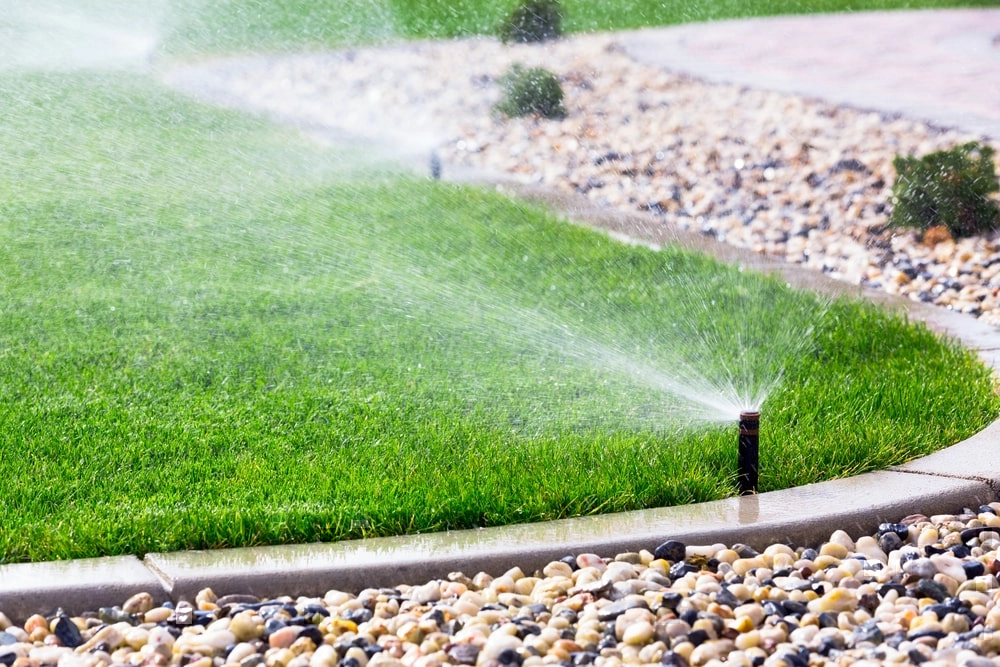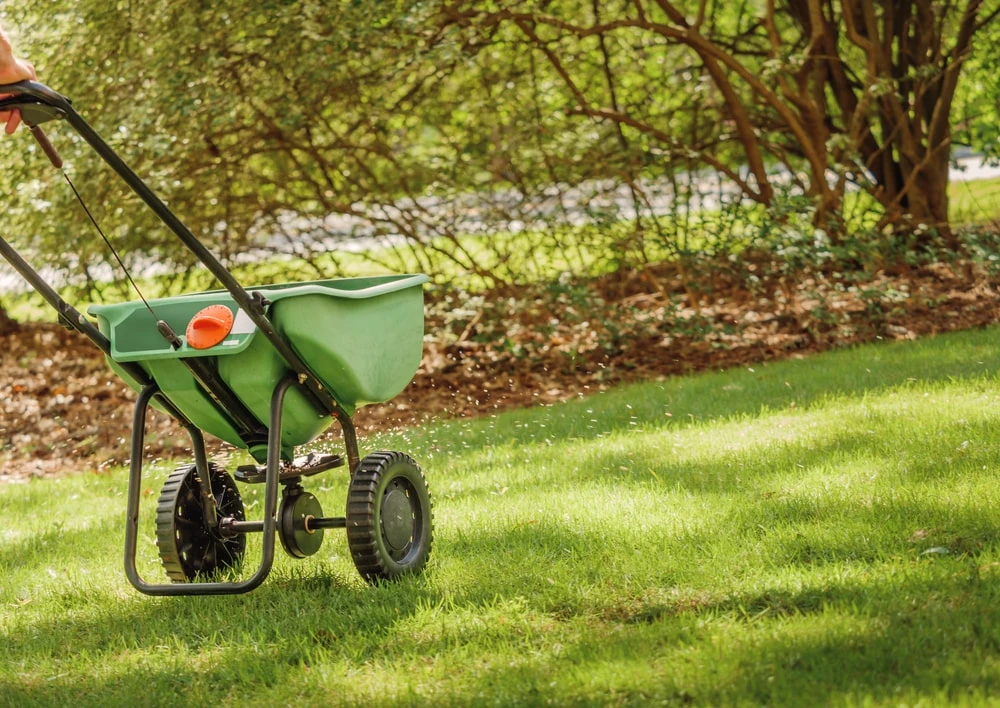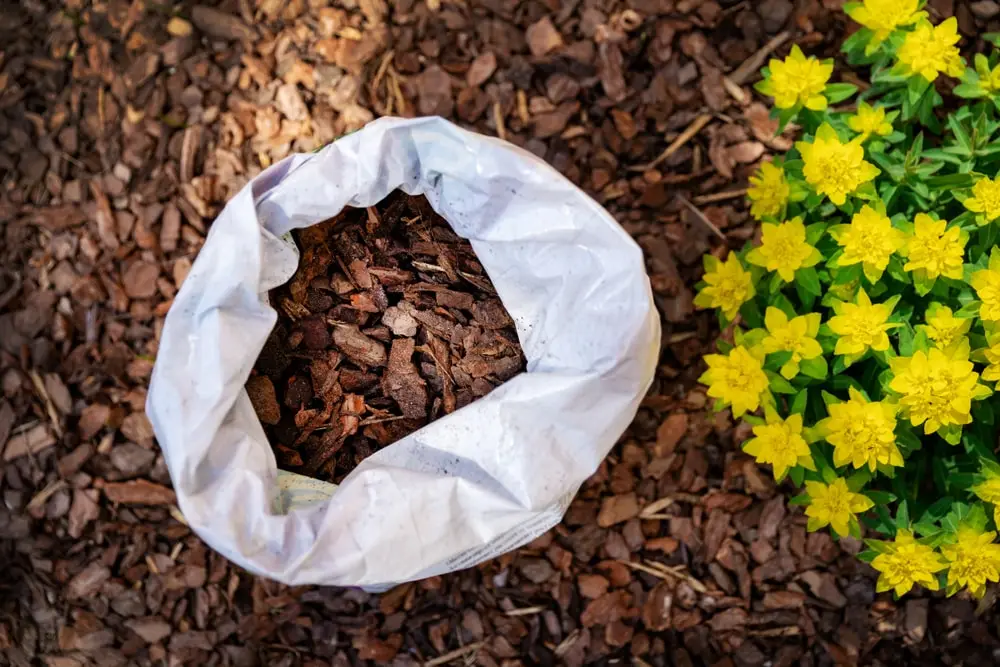
The Grounds Guys offer essential lawn watering tips to maintain a healthy yard.
|
Last Updated November 28, 2023
While it’s obvious that a lawn needs water to stay healthy and thrive, exactly how much water it needs is the answer many homeowners are looking for. The amount of water your lawn needs weekly to stay healthy will depend on factors like the time of year and the type of grass you have. Unfortunately, many homeowners are inadvertently overwatering their lawns, which can be as damaging as not watering it enough. Sure, your lawn and garden require water to stay green and healthy, but they may need far less than you think. This is good news in the face of increasing droughts, water restrictions, and rising water bills. Your lawn care exerts at The Grounds Guys® have some lawn watering tips that will help you conserve water while still maintaining a green, healthy lawn.
Table of Contents:
- Keep Your Eye on the Weather
- Water During the Cooler Hours
- Don’t Water Every Day
- Know When It’s Time to Water
- Check Your Irrigation System Regularly
- Keep the Grass Tall
- Only Use Fertilizer When Needed
- Limit Grassy Areas
- Put Plants with Similar Watering Needs Together
- Lay Down Mulch
- How to Water Your Lawn Efficiently
- FAQ Lawn Watering
Keep Your Eye on the Weather
.webp)
If it rains or rain is likely the day you plan on watering your lawn, turn off your irrigation system, or don’t bother setting up the sprinklers that day. When Mother Nature takes care of your watering needs, it gives you a chance to conserve water. Also, if it’s very windy outside, it’s best to wait and water another day.. Wind evaporates water in the air and on your lawn before it has a chance to soak in. A strong, steady wind will also drive water off course. On windy days, you may end up watering more of the pavement than you do your lawn.
Water During the Cooler Hours
.webp)
When it comes to watering your lawn, timing is everything. Watering in the morning rather than the evening or afternoon reduces evaporation, helps prevent fungal growth, and keeps you from scalding your grass. You’ll get more out of your watering and your lawn will be happier too!
Don’t Water Every Day
Less is more when it comes to watering frequency. Less frequent, deep watering encourages deeper root growth and healthier, more drought-resistant plants. An easy way to tell you’ve watered deeply enough is to place an empty tuna can on the lawn while watering. When it’s full, you’ve watered the right amount and can turn off the sprinklers.
Know When It’s Time to Water
It’s been a little rainy lately, but you haven’t watered your lawn in a few days. Is it time to water again? To find out, step onto the grass. If the blades spring up quickly after you lift your foot, it doesn’t need more water yet. If the blades stay flat, it’s time to water the lawn.
Check Your Irrigation System Regularly
.webp)
There are pros and cons associated with an irrigation system. However, if you have one, maintaining your irrigation system is important to achieve efficient watering of your lawn and other landscaping. If you don’t have an irrigation system and rely on sprinklers to provide your lawn and landscaping with water, be mindful of how you set them up. Make sure water from your sprinklers is not being directed onto the sidewalk, driveway, or street. If you’re using an irrigation system, fix any broken sprinkler heads, faulty valves, or leaky hoses as soon as you discover them. If you live in a cold climate, it’s also important to winterize your system to prevent damage and avoid issues when you turn it on again.
Keep the Grass Tall
.webp)
When you mow the lawn, set the mower height to the highest or second highest setting. Keeping grass about 3 inches long shades the soil better and slows water evaporation. Tall grass also grows less quickly and has deeper roots. All of these factors reduce the amount of water your lawn needs to stay healthy. Here are a few more lawn mowing tricks that will help keep your lawn thriving.
Only Use Fertilizer When Needed

One common mistake many homeowners make is over fertilizing their lawn. Overusing fertilizers results in fast-growing grass that requires more water. To make sure your grass stays green, only apply nutrients when the grass needs them. Use low concentrations or slow-release formulas for the best results.
With these water conservation tips, your lawn and garden will stay green and beautiful with less water required in the process.
Limit Grassy Areas
A large lawn easily consumes more water than the rest of your landscaping combined. If your garden has a large expanse of grass that serves little purpose, consider other landscape options that don’t include grass. Only keep grass in places to enhance curb appeal, where it’s used as a children’s play area, or for sports. Everywhere else, replace the grass with mulch, water-efficient ground cover, or a hardscape such as a deck or patio. Here are some additional outdoor landscape ideas.
Put Plants with Similar Watering Needs Together
Select low-water plants wherever possible for your garden. Plant them further away from the house, where irrigation may not be as readily available. Then, group all water-guzzling plants together so you can water them at the same time.
Lay Down Mulch

Mulch is a great way to protect and insult plants from extreme weather. Three inches of coarse mulch insulates the soil, reduces evaporation, maintains a more consistent soil temperature, and protects roots from the drying effects of hot summer weather, all of which means, you can water less often.
How to Water Your Lawn Efficiently
The key to efficiently watering your lawn is to understand the specific needs of your grass and then implement the lawn watering tips listed above. Cool-season grasses, like Kentucky bluegrass, ryegrass, and tall fescue, will need less water in the summer when growth slows and more in the fall when it peaks. These types of grasses tend to have a moderate level of drought tolerance, so they will need more regular watering than warm-season grasses.
Warm-season grasses include Bermuda grass, zoysia, and St. Augustine, and are better adapted to hotter environments. They can handle less water for longer stretches. These grasses tend to peak in summer and will need less water in the fall when they move into dormancy.
Once you understand the needs of your lawn, remember to water deeply less often rather than partaking in frequent shallow watering. Water in the early morning so less water evaporates, and avoid watering on windy days. Mow less often to reduce the stress on your grass, and don’t water as much when the rain does the watering for you.
Installing an automated irrigation system can help you avoid overwatering your lawn, especially if you use a smart irrigation system that can adjust watering based on precipitation. Adding an irrigation system to your property is an investment, but it could be worth it long-term if it helps you save water and lowers your monthly water bills.
Keep Your Lawn and Landscaping Looking Great Throughout the Seasons
While watering is certainly a part of maintaining a healthy, thriving lawn, there are many other aspects to keeping your lawn and landscaping looking great throughout the year. If you lack the time and expertise needed to keep your property looking its best, The Grounds Guys can help. We will assess your property and determine exactly what it needs to thrive. Our local team of experienced professionals can do everything from installing an irrigation system to aerating and fertilizing your lawn so it continues to grow healthy and strong. We can also help you manage water usage, which will improve your watering efficiency and reduce the amount of water wasted. We can also regularly inspect, adjust, and repair your irrigation system.
If you live in an area with water restrictions, we can switch out water-hungry grass and plants for more drought-tolerant options or replace your grass with turf grass or hardscape features. Our team of landscape design experts would love to work with you to redesign your landscape with water conservation in mind. We can also develop a design that meets your family’s needs, fits your budget, and looks beautiful all year round. All our work is backed by the Neighborly Done Right Promise™, which ensures your satisfaction.
Saving water doesn’t mean your lawn and landscaping has to suffer. Find The Grounds Guys location nearest you and schedule an appointment today. We are always happy to provide free estimates.
FAQ Lawn Watering
How do you water your lawn during a drought?
If your area is suffering from drought conditions, it's obviously important to scale back your water usage as much as you can. You’re probably wondering how to water your lawn under this circumstance.
First, always follow any water restrictions set by your city, county, or state. Next, switch to survival watering conditions, which means giving your lawn only enough water to survive. Your lawn may gradually turn yellow, then brown, but it can stay in this dormant condition for a few weeks without harm. You can bring your lawn back with regular, deep watering, once restrictions are lifted. You may also consider planting more drought-resistant plants and/or increasing the amount of hardscape you currently have.
When is the best time to water your lawn?
Some people assume that watering grass at night is the best time to water. However, dark, wet conditions are very inviting to fungus and other lawn diseases. The best time to water your lawn is actually just before sunrise or very early in the day. The temperatures will be coolest, which will lower the amount of water that evaporates.
Is it better to water deeply and infrequently or lightly and frequently?
If you’ve read our lawn watering tips above, then you already know the answer to this question. Watering your lawn deeply and infrequently is the best approach. A deeper watering will help ensure that water reaches the roots of your grass. Less frequent watering can also “train” your grass to tolerate less water better.
Is it safe to use gray water on your lawn?
As drought conditions become more common in many parts of the country, the use of gray water is growing in popularity. Gray water refers to water that’s been used in kitchen and bathroom sinks, dishwasher, and water from a shower and tub. (Don’t confuse gray water with black water, which is sewage water and is NOT reusable.
In most cases, it is safe to use gray water on your lawn. It’s usually not recommended to use gray water in a garden or on plants that grow fruits, vegetables, and herbs that you plan on eating. If you are considering watering your lawn with gray water, which includes laundry water, avoid using fabric softener and check your detergent. Certain detergents shouldn’t be used in gray water systems.